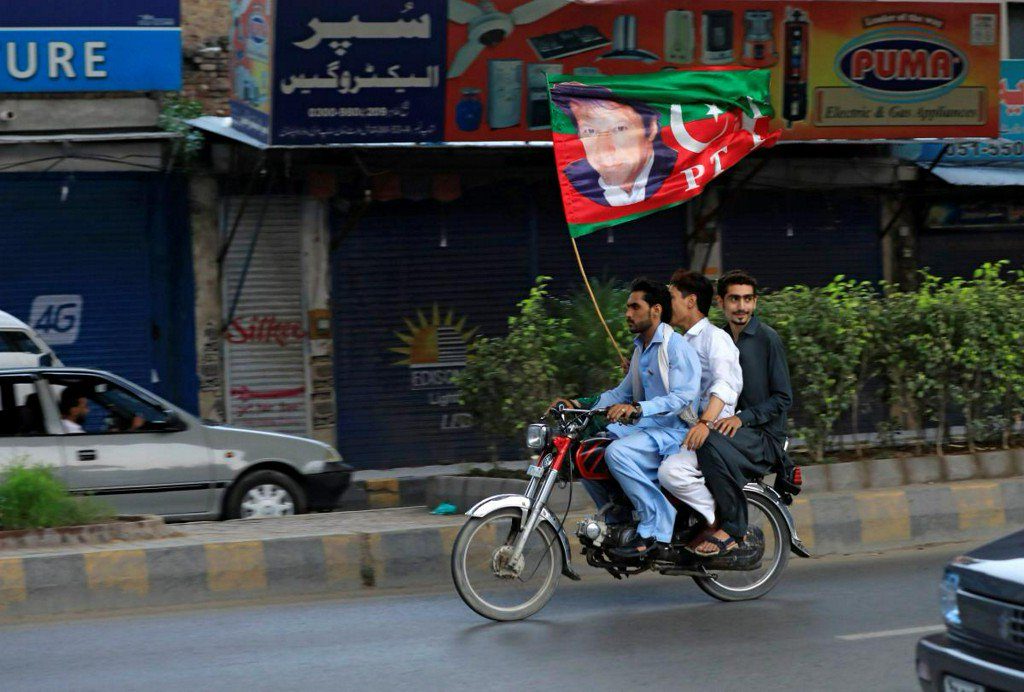Islamabad: “If they take one step towards us, we will take two; but we at least need a start,” 65-year-old Imran Khan said with reference to India Thursday in his first public address after his party, Pakistan Tehreek-e-Insaaf (PTI), emerged as the single largest party in the National Assembly with its candidates winning 86 seats and leading in 34 others. With votes counted in 49 per cent of stations, PTI was leading in 120 of the 272 National Assembly constituencies being contested, Pakistan’s newspaper ‘Dawn’ reported, citing election commission figures.
However, the party’s ‘victory’ came amid accusations of rigging by rivals. Imran is widely perceived to have the military’s backing in his bid to become Pakistan’s next prime minister. And he seems to have come a long way since his assertion six and a half years ago that “army’s days are over”.
Among the other parties in fray, jailed former prime minister Nawaz Sharif’s Pakistan Muslim League-Nawaz (PML-N) won 43 seats and was leading in 18 constituencies while Pakistan Peoples Party (PPP) led by former president Asif Ali Zardari won 18 seats and its candidates were leading in 22 seats according to available unofficial results and trends in the parliamentary polls.
Pakistan Muslim League-Nawaz (PML-N) President Shehbaz Sharif at a mid-vote count press conference said his party rejects the poll results. In a tweet, he said the party had rejected the results “due to manifest and massive irregularities”.
The voter turnout was recorded at 50-55 per cent of the nearly 106 million electorate, similar to the previous electoral contest in 2013.
Pakistan’s National Assembly comprises 342 members, of which 272 are directly elected, whereas the rest — 60 seats reserved for women and 10 for religious minorities — are selected later through proportional representation among parties with more than five per cent of the vote.
A party can only form the government if it manages to clinch 172 seats in total.
Elections were also held for four provincial assemblies – Punjab, Sindh, Balochistan and Khyber-Pakhtunkhwa. The provincial trends showed that the PTI was leading in 120 seats in Punjab followed by the PML-N with 119 seats in the provincial assembly of 299 members.
In Sindh, the PPP was heading towards a two-thirds majority in its traditional bastion. The party was leading in 72 seats according to the latest trends available for 113 of the provincial assembly’s 131 seats.
In Khyber-Pakhtunkhwa, the PTI was heading towards a two-thirds majority with its candidates leading in 67 seats. The KP assembly has 99 seats.
Balochistan was heading towards a hung assembly. Balochistan Awami Party was ahead in 12 seats while MMA was leading in 9. Balochistan National Party was leading in 8 seats. The election marks the second democratic transition of power in the nation’s 70-year history.
Extremist groups dumped at polls
Islamabad: Extremist and banned groups, including Mumbai attack mastermind Hafiz Saeed-backed Allah-o-Akbar Tehreek, have failed miserably in Pakistan’s general elections despite their massive campaign. Hundreds of individuals linked with hardline and banned groups were competing in the polls but so far, according to the unofficial results, none of them was seen as winning a seat in the national or provincial assemblies. Only a few could garner a respectable number of votes, including Maulana Muhammad Ahmad Ludhianvi, whose name was removed from a banned list called Fourth Schedule ahead of election and allowed to contest, inviting international backlash. Geo TV reported that hat Ludhianvi received more than 45,000 votes but was nowhere close to the victory.
